click to enlarge 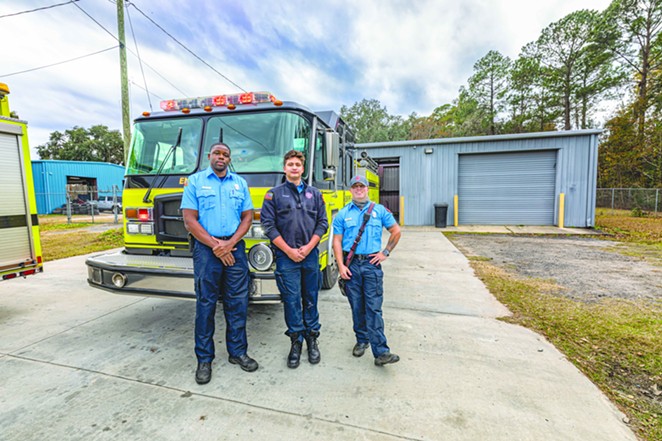
Alex Neumann/Connect Savannah
Chatham Emergency Services rescue workers between calls at Fire Station 13 on Quacco Road.
A long-smoldering problem is threatening the Chatham Emergency Services nonprofit firefighting agency, with the potential to soon engulf its ability to effectively provide varied public-safety functions countywide: a $3 million operating deficit.
According to CES leadership, the deficit is caused by some 25% of property owners within its coverage area – comprising approximately 242 square miles of unincorporated Chatham County – who are declining to pay for fire-service subscriptions. To address this shortfall, CES is asking the Chatham County Commission to take action, either by passing an ordinance requiring unincorporated-area residents to pony up for fire service or coming up with another solution that will get their books out of the red.
However, some commissioners are reporting that many unincorporated-area constituents who do pay for CES subscriptions feel they are being overcharged and taken advantage of, as the agency’s current subscription-fee structure is based on the assessed value of their homes, no matter how large or small they may be. Meanwhile, CES is using their fee revenue to put out fires at the homes of non-subscribers.
In response, CES Chief Operating Officer Phil Koster says that the agency is open to changing its fee structure to whatever methodology would be most agreeable for unincorporated-area residents, as long as concrete steps are taken soon to boost its endangered firefighting capabilities – or else some extremely difficult decisions may lie ahead when the homes of non-subscribers go up in smoke.
“We need to know where the county is for their unincorporated citizens relative to should we stop responding to non-subscribers,” Koster said. “Should we say, ‘Hey, look, y’know, they didn’t pay their bill, their house is on fire, we’re just not going to go’? That is a very difficult pill to swallow, and we don’t want to make that decision alone, so we’re asking the county to help us answer that question.”
To learn what Chatham residents believe may be the best solution to that question, county staff has created an online survey soliciting public opinion about the county’s fire-services options that will be active through Jan. 15, and planning is underway to host a series of virtual town-hall meetings to discuss this burning issue.
click to enlarge 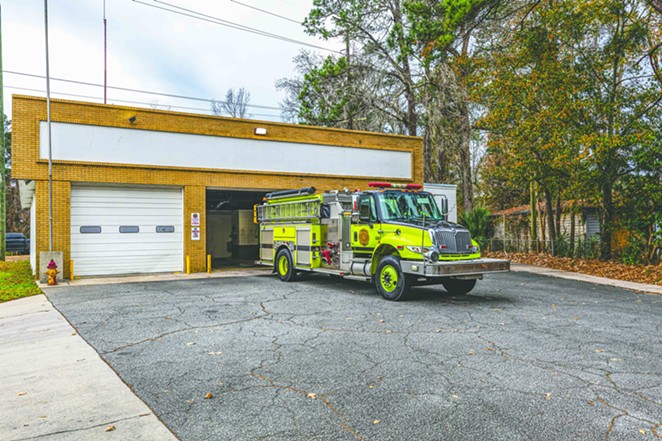
Alex Neumann/Connect Savannah
Chatham Emergency Services Fire Station 10 on Ogeechee Road, which is a repurposed 1940s airplane hangar.
A crisis fueled by rapid growth
Chatham County’s fire services are provided by nine separate agencies, with seven belonging to different municipalities while two nonprofit agencies – CES and the much smaller Isle of Hope Volunteer Fire Department – cover the brunt of the unincorporated-area communities, according to Assistant County Manager Linda Kramer.
Although Georgia law requires municipalities to provide fire services for their residents, county governments are under no such obligation, former Chatham County Commission Chairman Al Scott said during a workshop addressing the CES cash crunch on Nov. 5. At this meeting, Kramer noted that when Chatham’s Special Service District tax structure was formed in 1973 to provide municipal resources for the county’s unincorporated areas, their total population was considerably smaller at just over 24,000 residents, so establishing a new firefighting force was then seen as unnecessary.
“We have had substantial growth in the unincorporated county,” Kramer said, estimating that well over 90,000 people live in Chatham’s unincorporated areas today, drastically increasing the burden on CES to fight fires and provide other emergency operations ranging from ambulance service to water rescues to motor-vehicle-accident response.
The history of CES dates back much farther than Chatham’s Special Service District. According to Koster, the agency took root in the 1930s as a cluster of different volunteer firefighting squads tasked with extinguishing blazes in then-rural swaths of unincorporated Chatham. In 1961 those units consolidated to form Southside Communities Fire Protection, Inc., a name the agency retained (and is still frequently called) until rebranding itself as CES in 2017.
And while CES has expanded over the years to keep up with unincorporated Chatham’s rapid growth, its nonprofit-agency status leaves it with few means to collect payment for its services beyond depending on the goodwill of unincorporated residents who dutifully pay their subscription fees. Koster says that the CES operating budget for fiscal year 2020-2021 is $10.5 million, while its subscription income is only $7.5 million.
“Our biggest issue is the uncompensated services,” Koster said. “We provide a lot of services that are needed and requested, to which we receive no reimbursement for; 25% of our properties are non-subscribers. That is across the board. That is residences, we have hotels, we have businesses, large properties that choose not to become subscribers.”
click to enlarge 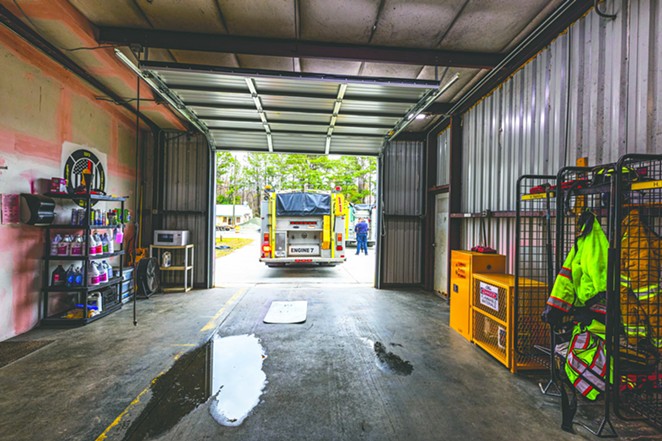
Alex Neumann/Connect Savannah
The interior of Chatham Emergency Services Fire Station 13 on Quacco Road.
‘If you call, we’re coming anyways’
An uncompensated board of directors governs CES, which maintains 159 full-time personnel spread out across 14 fire stations, some of them being dilapidated facilities that have been in constant use for 80 years, Koster said. Other CES facilities have awkward shortcomings, such as Station 13 on Quacco Road, a rented shack that is so small the front bumper of the fire truck stationed there had to be removed so that it would just barely fit inside.
While the CES directors have taken actions to address the agency’s financial shortages in recent years, including saving money by purchasing used fire trucks and erecting cell-phone towers at stations to earn additional revenue, needs of the ballooning unincorporated-area population are outpacing the ability of CES to maintain its current service levels, according to Koster.
In 2019, CES fielded 4,838 fire calls for an average of 13 each day, while simultaneously responding to just under 70,000 emergency medical service calls, or about 191 daily, Koster said – and these are only the agency’s run-of-the-mill tasks, excluding the need of CES to be constantly ready for major disasters.
“It is not always what you do each day, it’s what you’re prepared to do when the phone rings or when the alarm drops, and that can be very expensive,” Koster said. “We have to provide the same level of service whether you live on Skidaway Island or whether you live on the far reaches of Fort Argyle Road, and that’s where it can be very costly.”
And while it remains the CES policy to put out fires at homes of non-subscribers, this situation is becoming increasingly untenable, according to Koster.
“If you call, we’re coming anyways. At this point, we don’t decide you’re a subscriber or not; your life and safety of that property is more important to us,” Koster said, noting that non-subscribers can be charged up to $20,000 for CES firefighting services, and that a fire report needed for insurance claims can be withheld as an incentive for payment.
“After a fire, even if they’re not a subscriber, yes, we can try to bill them or hold onto the fire report, but that is also not successful. That leads to the deficit.”
click to enlarge 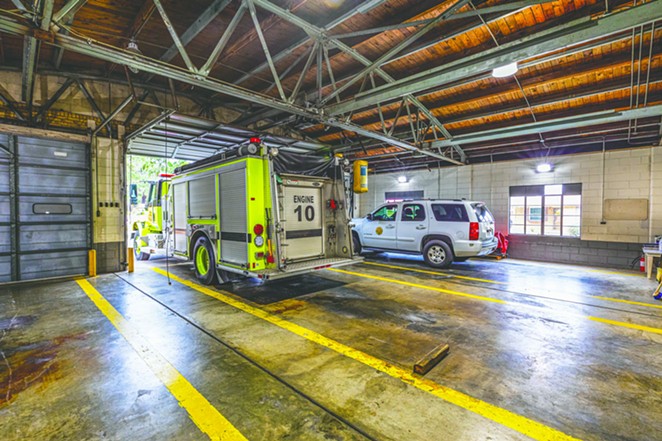
Alex Neumann/Connect Savannah
The interior of Chatham Emergency Services Fire Station 10 on Ogeechee Road, which is a repurposed 1940s airplane hangar.
Debating the subscription-fee structure
While none of the Chatham County Commissioners have expressed a willingness to let the homes of non-subscribers burn to the ground, some have said that the current situation is unfair to those who duly pay their subscription fees − especially after CES reassessed its rates in autumn of 2019 to reflect updated property values, resulting in higher bills.
“Our subscription program was antiquated. There was a huge honor system, whereas if you bought your house in 1993 and you said it was worth this much, we took you at your word and your subscription rate was carried forward,” Koster explained. “We have been able to get information by going to the Board of Assessors to actually get the true value of the properties, and we’ve done that, which helped us increase our income.”
However, according to Commissioner Helen Stone of District 1, this reassessment has caused rates to nearly double for some unincorporated-area homeowners.
“I have some concerns as to how this fee structure’s set up, and how we can be more balanced about it,” Stone said to Koster at the Nov. 5 workshop. “We have a segment of the community that is not paying, so in essence what’s happening is you’re putting the burden on the people that are. … How can we get your organization where it needs to be financially secure, but not on the backs of people that are trying to do the right thing and pay?”
At this meeting, then-Commissioner Tabitha Odell of District 5 passed on complaints that the CES fee-assessment structure being based on a home’s value is flawed, because a blaze at a small home in an expensive area may not require as many resources to extinguish as a fire at a less-valuable building that could be much bigger.
“The pushback that I get from people in the 5th is that they don’t want to pay based on market value of the house,” Odell said. “They want to pay based on square footage.”
Koster replied that if the County Commission would like to pursue another method of collecting subscription fees, this would be fine with CES as long as it would solve the budget shortfall.
“We are open to any methodology in regards to collection, if the county feels that it should be a flat fee or if it should be a square footage,” Koster said. “We are very open to that. At the end of the day, we just need to make sure we can cover our expenses. That’s what we’re looking for.”
Toward the conclusion of the Nov. 5 meeting, Chairman Scott said that additional workshops would be held to delve deeper into potential solutions to the CES budget issue. Kramer added that an online survey would be developed to provide all Chatham County residents with an opportunity to provide feedback about their fire service. This survey was activated in December, and will remain available to be filled in at
chathamcountysurvey.org through Jan. 15.
click to enlarge 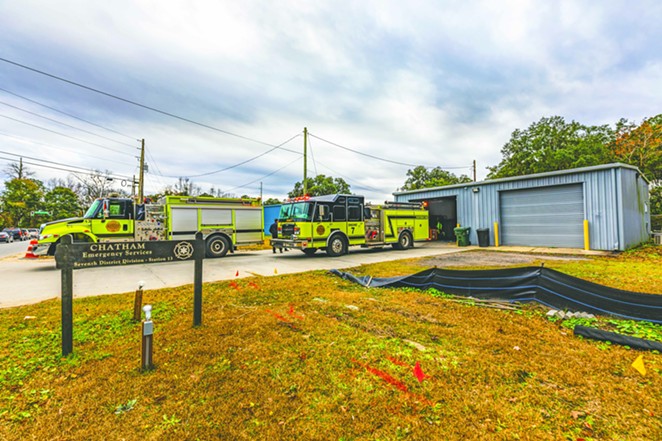
Alex Neumann/Connect Savannah
Chatham Emergency Services Fire Station 13 on Quacco Road.
Six options to address the problem
The County Commission met again to discuss the situation surrounding the CES financial shortfall on Dec. 18, when Kramer introduced six possible options for consideration in dealing with this issue, ranging from the lowest to the highest level of participation for Chatham officials:
1. Maintaining the status quo, leaving the CES with the same unenforceable subscription-payment system, but possibly updating the county’s fire-district maps to shift coverage of certain areas to the jurisdiction of some municipalities’ fire departments.
2. Adopting an ordinance requiring all property owners in unincorporated Chatham County to subscribe to fire services, with the service provider collecting subscription fees from the property owners and county officials enforcing penalties for non-payment.
3. Charging a new fire fee on county tax bills to property owners in the unincorporated areas instead of their individually paying for subscriptions, with the fee schedule and service contracts to be negotiated with service providers and the county paying or passing these fees directly to them.
4. Establishing a new tax to fund fire services by setting up new fire districts within the county and assessing a new millage levy, which would be included on property tax bills and based on the value of each property without caps.
5. Developing new fire-service contracts with fire-protection providers that would be paid with a tax-rate increase in the Special Service District, with taxes invoiced and collected by the tax commissioner on property-tax bills.
6. Having the county establish an entirely new fire department to be funded with a Special Service District tax increase, while dissolving existing fire-service providers in the unincorporated areas.
Following her presentation of these options, Kramer noted that they are all included on the fire-services survey, and that the public might feel the most confidence in option six, although she said the opinion of county staff is that establishing a completely new fire department would be the most costly and the biggest undertaking, especially after Chatham leadership has committed to several expensive public-safety endeavors in recent years.
“We’ve established a police department, we’ve taken on 911, animal services, marine patrol – we’ve done a lot,” Kramer said, adding that the cost of building a new fire department from the ground up would be prohibitive. “The equipment’s expensive, the stations are expensive.”
During the Dec. 18 meeting, incoming Commission Chairman Chester Ellis (then serving as District 8 Commissioner) estimated that establishing a new fire station could cost county taxpayers over $400 million, raising the point to emphasize how important the survey feedback would be for the board to determine what steps to take next.
“We really need for the unincorporated residents in Chatham County to do that survey, so we will know exactly what they’re talking about,” Ellis said.
Reached by telephone on Jan. 5, the day after he was inaugurated as the new Chatham County Commission Chairman, Ellis added that he is working on scheduling virtual town-hall meetings with residents of all eight county districts before the board takes up this issue for a vote in the upcoming months, with details about these forums to be released in late January.
“We’re trying to give folks a chance to have input,” Ellis said, while repeating his hopes that many unincorporated-area residents will fill out the fire-services survey by Jan. 15. “We can get a fair understanding of where people are before we make a decision.”







